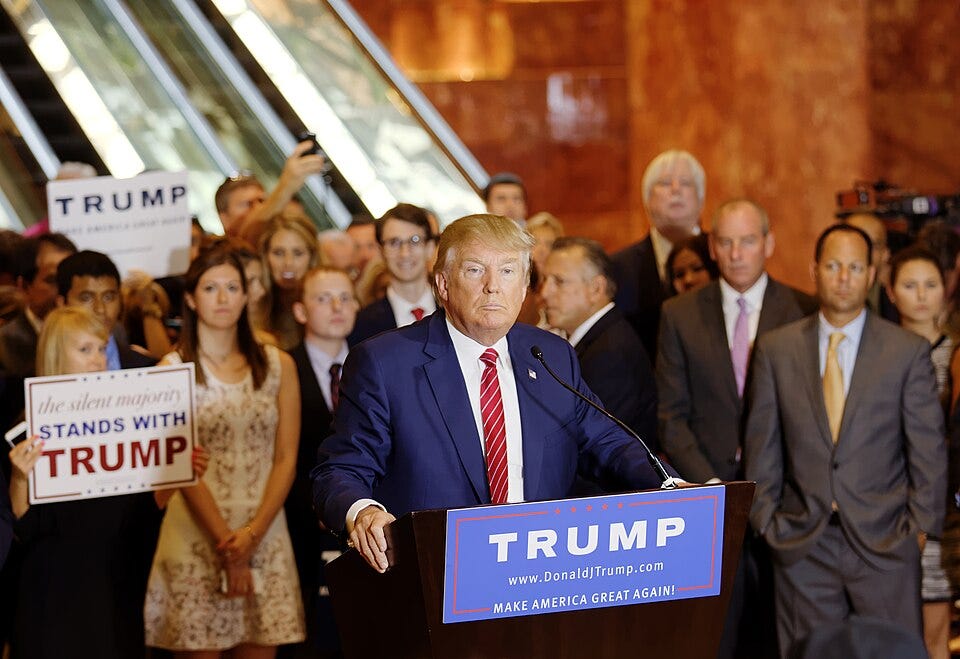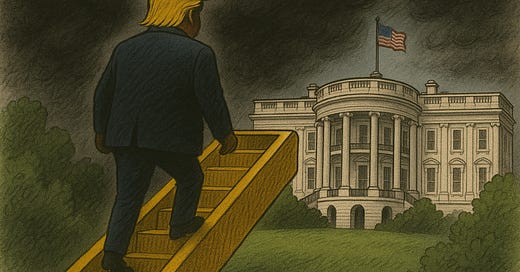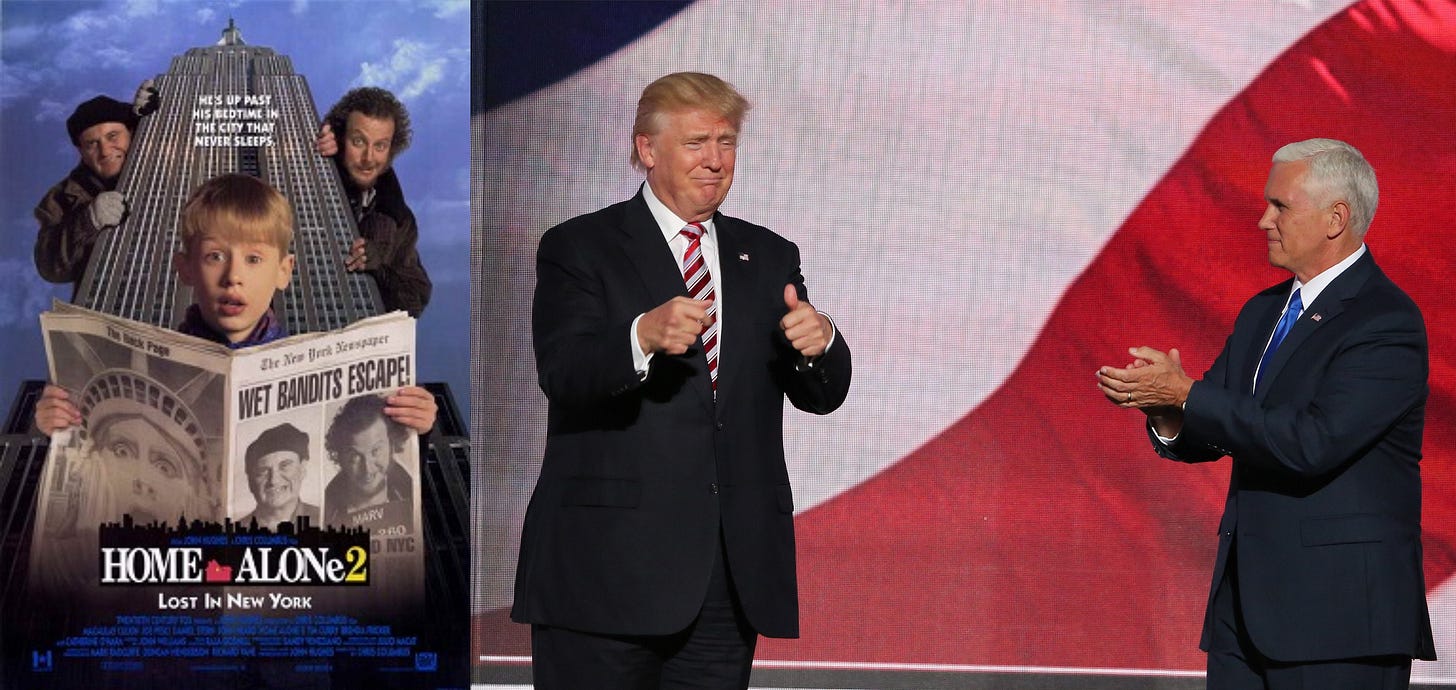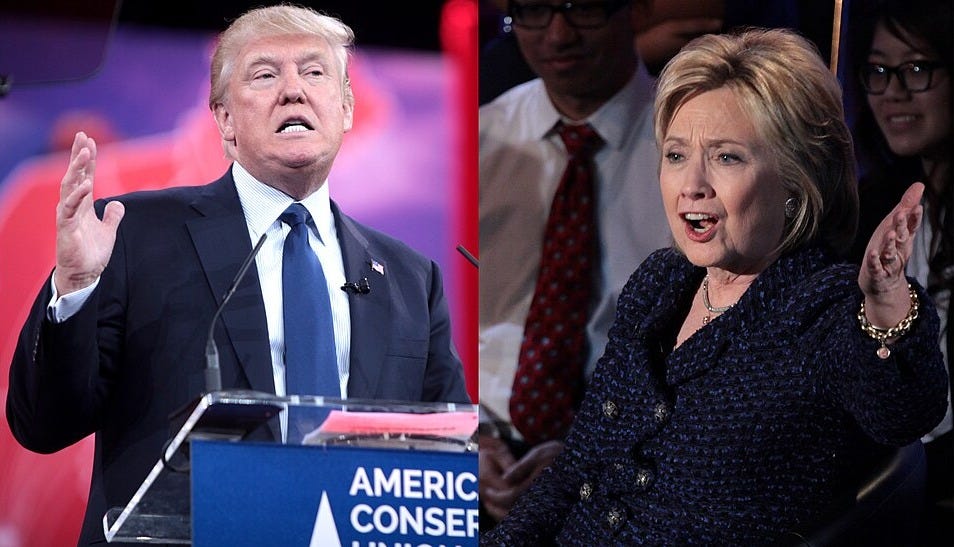Let me begin by thanking everyone who took the time and effort to write to me about their views concerning the rise of Trump and what the future may bring. I am very grateful indeed for your insights about the most puzzling phenomenon in the history of American politics. This chapter will be about the rise of Trump. The next chapter will be about possible futures.
The Paradoxical President
I believe that Donald Trump can best be thought of as “the paradoxical President.”
Here is what I mean. A pediatrician might suggest that a child take Benadryl. A common side effect of Benadryl is mild sedation. However, occasionally children become hyperactive when taking this medication. This is called a paradoxical reaction.
Over the past decade, Donald Trump has been accused of everything imaginable. Indeed, before Trump, some of what he has been accused of was outside the realm of political discourse.
Accusations which would have ended the career of any other politician, simply served to supercharge Trump’s race to the Presidency. These endless charges have had the opposite effect of what is intended.
This is why Trump can be thought of as the paradoxical President. Or, as Friedrich Nietzsche put it in Twilight of the Idols: “That which does not kill me, makes me stronger.”1
The Rise of Trump
Ten years ago today, Donald Trump rode down the escalator at Trump Tower to announce his candidacy for the Presidency. On that day, no one - but no one - predicted that during the course of the next decade and a half (if not longer, time will tell) Trump would become the most important American political figure since Franklin D. Roosevelt; and, because of the Presidential immunity decision delivered by the Supreme Court in 2024, the most powerful American President in the nation’s history. Trump has Congress in his pocket. The only check on his power is the legal system, whose efficacy remains to be proven. At this writing, Trump feels that he can do anything. He may be correct.
The event that he staged on January 16, 2015, typified the man, the campaign he would run, and the President he has been and remains. It was glitzy. It was showy. It was fake.

As he was coming down the escalator, Trump said “Wow. Whoa. That is some group of people. Thousands!”2
Here is the truth: “There were a few dozen people lining the area leading down to the escalator, and then there were a couple dozen downstairs where the event actually took place.” “There were some people who lived in the building who had come down, and then there were just a lot of people just kind of from off the street who had come in to see it. There was a lot of just random curiosity happening.”3
The Trump campaign paid some people $50 to attend the event. “We are looking to cast people for the event to wear T-shirts and carry signs and help cheer him in support of his announcement,” read the casting call. Campaign manager Corey Lewandowski denied that anyone had been paid to attend. He was lying. You can read the casting call online.4
Trump delivered a 47-minute speech that day to introduce himself to the public as a candidate for the Republican nomination for the Presidency. The speech was boring, boastful, rambling, crude, and disorganized. It would have ended the career of any other politician. However, it was delivered with complete self-confidence.5 Trump adopted the stance he has kept ever since. He was the anti-politician.
What were Trump’s chances of winning the Republican nomination for the Presidency when he announced his candidacy? They did not seem to be very good. CNN gave him a one percent chance of winning the nomination as of July 9.6 By August 1, 2015, there were 16 other candidates for the Republican nomination. Four of these candidates declared after Trump did on June 16, suggesting that they did not think Trump posed a major problem. Almost all of these people were professional politicians, some of whom had notable name recognition. One analyst from FiveThirtyEight, Harry Enten, even wrote that Trump had a better chance of appearing in another Home Alone movie than winning the nomination.7
Nate Cohn wrote in the New York Times a month after Trump’s announcement: “Even a cursory look at Mr. Trump’s political record reveals a candidate with serious liabilities once journalists and campaigns started taking him seriously. He has donated more to Democrats than Republicans over the last decade. He has even donated to Hillary Rodham Clinton, whom he has said he likes, and the Clinton Foundation. He has supported universal health care and seems to continue to do so. He has supported a $5 trillion tax increase and has said he is “very pro-choice,” although he has since changed his position on abortion. He is self-evidently unelectable in a general election, combining terrible poll numbers with an unpresidential persona.”8
The quotation above is the essence of the problem which Trump’s competitors faced in the campaign for the Republican nomination. In the words of one campaign consultant, they were all “using the old rules in a very, very new game. This cycle is different than[sic] all the rest. Those old lines . . . . They’re garbage. . . . They’re not going to work against Donald Trump.”9 He was right. Those old lines did not work.
There were two defining moments in the debates among those seeking the Republican nomination for the Presidency which powerfully propelled Trump’s candidacy forward.
The first debate took place on August 6, 2015, in Cleveland, in front of a live and raucous audience. One of the questioners was Megyn Kelly. She said to Trump: “You’ve called women you don’t like fat pigs, dogs, slobs, and disgusting animals. Your Twitter account [at this point Trump interrupted her and said “only Rosie O’Donnell” and the auditorium erupted in laughter and applause] Kelly continued: “For the record, it was well beyond Rosie O’Donnell.” Trump, speaking over her, said “Yes, I’m sure it was.” Kelly continued, “Your Twitter account has several disparaging comments about women’s looks. You once told a contestant on Celebrity Apprentice it would be a pretty picture to see her on her knees. Does that sound to you like the temperament of a man we should elect as President and how will you answer the charge [that] Hillary Clinton, who is likely to be the Democratic nominee [will make] that you are part of the war on women?”10
Consider this for a moment. This was more of an indictment than a question. Surely never before had a candidate for the Presidency been confronted so bluntly with his unforgivable statements. How does one handle this?
Trump responded: “I think the big problem this country has is being politically correct.” This statement was met by cheers from the crowd. “I’ve been challenged by so many people, and I don’t frankly have time for total political correctness. And this country doesn’t have time either. . . . And frankly, what I say. . . . And often times it’s fun, it’s kidding, we have a good time, what I say is what I say. Honestly, Megyn, if you don’t like it, I’m sorry.” By which, of course, everyone understood him to mean not that he was not sorry and that he could not have cared less.11
Trump’s response was masterful. The audience was completely on his side. And he proved an important point. Frontal attacks on him were going to avail you little.
The second defining moment came during the sixth debate on January 14, 2016, in North Charleston, South Carolina. Senator Ted Cruz accused Trump of having “New York values.” Trump responded by so effectively invoking New York City’s response to the 9/11 attacks that Cruz looked at him and applauded.12 Cruz applauded at his own castration.
And Trump proved another important point. Flank attacks against him will also avail you little.
Trump was officially nominated by the Republican Party on July 29, 2016. Why? Senator Lindsey Graham who had unsuccessfully run against Trump said, “My party has gone batshit crazy.”13 Actually, there is no better explanation.
Frontal attacks and flank attacks did not work. How, then, do you deal with Trump? His opponents thirsting after the Republican nomination for President never figured it out. The Democrats and their standard-bearer Hillary Clinton, as we shall see, never figured it out either.
To this very day, how to handle Donald Trump remains the unanswered question of American and global politics.
The Clinton Conundrum
On July 26, 2016, Hillary Rodham Clinton was nominated to be the Democratic Party’s candidate for the Presidency. She had battled for that position against Senator Bernie Sanders, a left-wing populist. Although she defeated him, he was popular; and a good deal of bitterness remained on the part of his supporters.
What ensued was a staggeringly ugly campaign between Trump and Clinton. The most remarkable event was the dissemination of the Access Hollywood tape. Trump was captured on tape saying: “I did try to fuck her [the name of woman referred to was not on the tape]. She was married. . . . You know, I’m automatically attracted to beautiful. . . . I just start kissing them. . . . Just kiss. I don’t even wait. And when you’re a star, they let you do it. You can do anything. Grab ‘em by the pussy. You can do anything.”14 Compared to this, Megyn Kelly’s question, which at the time seemed so devastating, was mere child’s play.
The Access Hollywood tape was made public on October 7, a month before the election and two days before the next debate between Trump and Clinton. Trump actually apologized, saying “these words don’t reflect who I am.” He also said, this was “locker room banter.” “Bill Clinton has said far worse to me on the golf course. . . . Not even close.”15 Classic Trump. Attack! Attack!! Attack!!!
The whole world was buzzing with Trump's remarks. October 9 saw the next confrontation between Clinton and Trump, staged at Washington University in St. Louis. Shortly before the debate, Trump held a press event with four women who claimed that Bill Clinton had sexually abused them.16 During the debate, Trump dismissed the Access Hollywood tape as just talk and contrasted it with what he accused Bill Clinton of having done to women, four of whom were in the audience that night. As Trump was speaking, there was a reaction shot of Bill Clinton, who was in the auditorium. He was stone faced. Watching this event, even now, makes one cringe.17
The campaign was utterly repulsive. The outcome was shocking. The election took place on November 8. Almost everyone predicted a Clinton victory. An expert at Princeton University stated that the “most probable single outcome” of the election was Clinton with 323 electoral votes to Trump’s 215.18 Trump himself apparently thought he would lose.19
Trump won with 304 electoral votes to Clinton’s 227. This was the climax of his rise to power, the effect of which is very much with us today.
Why did Trump win?
A long list of reasons could be offered. Three will be briefly presented here.
The structure of Presidential elections. Trump may have won the electoral vote, but Clinton won the popular vote by a wide margin. She received 2,864,974 more votes than Trump, the largest popular vote margin of any losing Presidential candidate in U.S. history.20 This was not a close election. If the people, rather than the electoral college, elected the President, Trump would have lost. And having lost, he would have ceased to be a factor in American politics.
The Clinton candidacy and campaign were both deeply flawed. She presented herself with a sense of entitlement that was off-putting. She had a history dating back to 1992 of insulting voters. Recall her declaring that she was no Tammy Wynette. Also in 1992, she said, “I suppose I could have stayed home and baked cookies and had teas, but what I decided to do was to fulfill my profession.” Observed the New York Times: With this wisecrack she “became a radical feminist in her critics’ imagination, the Lady Macbeth who was an affront to the choices so many other women had made.”21
It is important to note that Clinton was not alone in making demeaning comments about people whose votes were sought. When Barack Obama and Clinton were competing for the 2008 Democratic Presidential nomination, Obama said, referring to working-class voters in the rust belt decimated by job losses, "They get bitter, they cling to guns or religion or antipathy to people who aren't like them or anti-immigrant sentiment or anti-trade sentiment as a way to explain their frustrations."22 Democrats are puzzled about why they have lost the allegiance of working class people who were once their mainstay. Considering remarks like these, it is not that surprising.
As was evident when she ran for the nomination of the Democratic Party in 2008, Clinton was not a natural on the campaign trail. To the contrary, she was ill at ease and that uneasiness was unattractive.
It is noteworthy that the United States has never elected a woman to its highest office. It is at least possible that she lost more votes because she was a woman than she gained for the same reason. Trump ran for the Presidency three times. In 2016 and 2024, he ran against women and won. In 2020, he ran against a man and lost. This is a very small sample, but there you have it.
Clinton offered the nation four years of more of the same, an extension of the Obama Presidency. 2016 turned out to be a change year.
Donald Trump came on the political scene as an apolitical celebrity. The Apprentice television program made him nationally famous. Even though he had bankrupted a half-dozen companies, this program made him look like a fabulous business success.
To be sure, elements of the Trump persona had popped up periodically in American political history. Huey Long was a populist and quite an entertainer. He might well have become the first Donald Trump had he not been assassinated. Joe McCarthy lied as shamelessly as Trump and for a time got away with it. George Wallace shared Trump’s racism and also, like Trump, encouraged violence at his rallies. Ronald Reagan was an actor, and he has been quoted as asking: “How can a President not be an actor?”23 As the host of General Electric Theater, Reagan became a television star and a guest in millions of American homes thanks to the ubiquity of television. H. Ross Perot was, in contrast to Trump, a genuinely successful businessman. He ran for President in 1992 and 1996. In 1992, he received 18.9% of the popular vote but no electoral votes.
Thus, Trump came upon the scene as a cocktail of Long-McCarthy-Wallace-Reagan-Perot. Add to that the serial violations of accepted sexual behavior – the allure of the forbidden - and you have a political figure that the nation had apparently been waiting for.
Friedrich Nietzsche, Twilight of the Idols, Aphorism 8. https://www.gutenberg.org/files/52263/52263-h/52263-h.htm
www.youtube.com/watch?v=apjNfkysjbM
https://www.theguardian.com/us-news/2019/jun/13/donald-trump-presidential-campaign-speech-eyewitness-memories
https://www.hollywoodreporter.com/news/politics-news/donald-trump-campaign-offered-actors-803161/
www.youtube.com/watch?v=apjNfkysjbM
www.cnn.com/2015/07/09/politics/donald-trump-data-pivit-2016-election
Google AI
https://www.nytimes.com/2015/07/21/upshot/the-trump-campaigns-turning-point.html
www.youtube.com/watch?v=WgzChuYprSo
www.youtube.com/watch?v=2rU4W3yfd58
www.youtube.com/watch?v=2rU4W3yfd58
www.youtube.com/watch?v=zm1PrZnBQ24
https://www.seattletimes.com/nation-world/nation-politics/senator-on-gop-backing-trump-party-has-gone-batshit-crazy/
https://www.nytimes.com/2016/10/08/us/donald-trump-tape-transcript.html
https://www.independent.co.uk/news/world/americas/donald-trump-women-grab-them-bill-clinton-far-worse-a7351376.html
https://www.theguardian.com/us-news/2016/oct/09/donald-trump-women-bill-clinton-sex-scandal-hillary-debate
www.youtube.com/watch?v=KAmBYEHE4H0
https://election.princeton.edu/articles/final-projections-2016/
https://www.politico.com/story/2016/12/donald-trump-wisconsin-232605
https://abcnews.go.com/Politics/hillary-clinton-officially-wins-popular-vote-29-million/story?id=44354341
https://www.nytimes.com/2016/11/06/us/politics/hillary-clinton-cookies.html
https://www.theguardian.com/world/2008/apr/14/barackobama.uselections2008
https://www.goodreads.com/quotes/481216-how-can-a-president-not-be-an-actor









